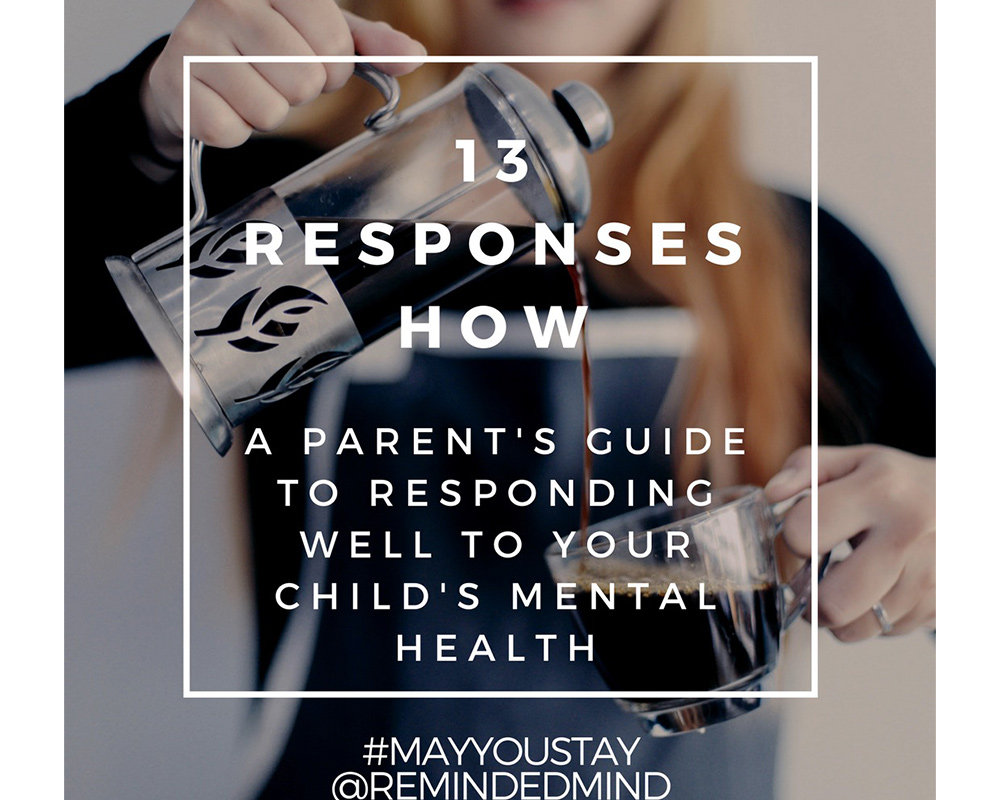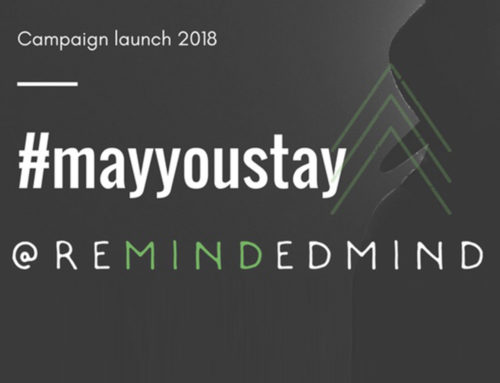13 Responses How
ReMindEd • May 28, 2017
As a parent, having watched the Netflix series, ‘13 Reasons Why’, I was taken back to my schooling days, the bullying, the difficulty choosing an identity, the culture of my school, the peer pressure, the sexual advances, rumours and innuendos. And we didn’t even have mobile phones or social media!
It is a very confronting series simply because it is so realistic, as it should be. I watched an interview with the producers who decided to portray the events in a realistic, graphic way, to do justice to the people who can relate to the issues the episodes raise. They said to portray things in a less confronting way would have lessened the severity of the issues. I do agree.
So this is my second response to the series. My first: ’13 reasons why not’ was aimed at the suicidal teen, at the ‘Hannah’s’, the character who completes suicide in the series. This response is aimed towards parents, and how, as a parent, we can respond better to our children, what to look for, how to start a conversation, and most importantly, how to see your teen and what they are trying to tell you.
13 responses how: a parent’s guide to responding well to your child’s mental health.
1. Your child is a human being
For parents, it was only yesterday we were changing our child’s dirty nappy and trying desperately to teach them how to sleep through the night. Even when it was actually fifteen years ago! We forget how quickly it changes to worrying they’ll stay awake through the day! Time, for us parents, has gone very quickly!
It is for that reason, we often see kids as just that: kids. As a child. As a small, young, blank and innocent canvas who couldn’t possibly have anything to worry about. Is that not the common response from most adults when a child or teenager suicides or has mental health issues?!
But your child, regardless of their age, is a human being. They see the world. They have strong emotions and thoughts and fears. They often soak up more than we know and hear more of adult conversations than we’d like to admit. Children and teenagers can and do have things to worry about, things to fear, things they are confused about, and sometimes these can turn into a real mental health concern or condition, just as it can in adults. Your child is a human being, just trying to be who they are in this world. And as a parent, your response to your child’s identity formation process is vital to their mental health.
2. Know who your child is
This is a big one, as it’s actually hard to do, simply because your child is still working out who they are, and it changes often. That’s the point. Spend time with your child often. Notice who they are, what their latest interest is, ask about what they are into today. Show interest.
A game I regularly play with my kids at home is ‘the favourites game’. It’s a fun, simple game kids of any age can play, and it’s a great conversation starter in the car or around the dinner table. Simply fill in the gap at the end of the sentence, “what is your favourite…..?” and have each person, adults included, answer. For example, what is your favourite colour, food, thing to wear, tv show, hobby, time of year, game, drink, dessert, lolly, subject at school, sport. Keep going and have each person take it in turns of filling in the gap in the question. Make it quick, and add in some funny ones to lighten it up. Yes it’s a fun game, but each time I do it with my kids, I do learn something new about them that has changed.
In the same way, show interest, go to sporting events, take them shopping and let them choose an item of their choice (have a $ limit), spend a little longer at bedtime asking them about their day. The more you know your child, the more likely you are to notice a change, including one in their mental health.
3. Quality not quantity
Kids’ needs are pretty simple. It’s adults that complicate it. Most kids just want their parent’s attention. They want you to spend time not money. And it’s not about the length of time, it’s about the quality. When was the last time you spent one-on-one, uninterrupted time with your child? And it rarely matters what you guys do together, it’s about who they are doing it with. They just want to be with you.
So put your phone down, don’t check the screen when an email or text alert sounds, don’t remember something you need to do half way through a conversation and become distracted. It’s about uninterrupted quality time. Aim for five minutes each day per child. Just five minutes. Whether that be lingering a little longer when you put your child to bed, whether you notice they are playing a game and ask to join in, or whether you drive the longer way home so you can chat for a little longer. Look for moments. And the funner that moment is, the more memorable to the child. Have a laugh. Make a joke. Talk about poo. Find joy amongst the mundane. It’s a great skill to teach your child.
4. They don’t need advice, they need you
There’s a scene in ’13 reasons why’, when the mother of one of the male characters Clay says to her son, “I can’t help you if you don’t talk to me”, to which Clay answers, “You can’t help anyway Mum”.
Too often as parents, we want to fix things, to offer advice, to help, to do something. But to a teen, they long stopped thinking we could fix things for them, because we can’t. So don’t try. Unless they specifically ask for help or for your opinion, don’t offer one. When they come to talk to you they usually want to be seen and heard. That’s it. So validate their experience, acknowledge their emotions, and offer hope. Here’s an example: “I’m sorry that happened to you. It sounds like it really sucks and it makes sense you are upset. You won’t feel upset forever. You can get through this”. And ask if they need anything else from you. If not, offer them a hug and leave it.
5. Respond not react
This one is really important. Often kids offer their parent a small piece of information to see what they will do and say. They may randomly say something a bit shocking or a bit random or just weird. They may just be testing you. So be alert. You have an opportunity to prove you are trustworthy, that you won’t freak out and that you care even about the little things.
Someone once said to count to five before you say or do anything. The idea is think first. Do not get mad, or annoyed, or embarrassed, and if you are, do not show it! Choose to respond not react. Stay calm, and throw a question back onto them rather than assuming they want you to fix it or give your opinion. For example:
Johnny says: “Mum, this kid at school was talking about drugs and how he was getting a score after school”.
Rather than saying: “Oh my God Johnny. Who was it? What was his name?… I’ll phone his mother. You know what I think about taking drugs. You better not be on drugs Johnny. Are you on drugs Johnny?”
You may think that is over the top, but seriously, the amount of kids who tell me their parent reacted to information with accusation and assumption is really sad. And guess what, those same kids learn to never tell their parent anything about drugs again. Or anything else for that matter!
The better response is something like this: “Ok. Thanks for telling me Johnny. What do you think about that kid at school taking drugs?”
Answer by thanking them for telling you, to encourage them telling you things in future, and then respond with a question back to them about what they think or are feeling about it. That’s usually the part they are wanting to share rather than the information. It then may open a lovely conversation about what Johnny was really wanting to tell you. You may then have a chance to talk about risks of drug use, peer pressure or making good choices. Or it may not. The point is, let your child lead the conversation and where it goes and when it ends. They will then establish trust and are more likely to tell you something bigger next time, perhaps when the person they need to talk about is themself.
6. Be approachable about anything
This one may sound daunting to some parents. I do appreciate, not all parents are like my husband and I, where we spend all our time as mental health professionals, hearing people’s stories. I realise we are quite desensitised. It is easy for me to say thisto my kids, “There is nothing you can’t tell me”! I have gone as far as to say to my eldest daughter, were she to ever kill someone, she could still tell me and we would work it out together.
That is the point. We don’t need all the answers. We just need our kids to know that we will help them through anything.
As parents, this may be the single most important promise we make our children: that no matter what, we will still love them and will help them through. To foster hope is so important. Hope that things will get better, that this too shall pass, that they won’t feel like this forever, that things will get easier, that they will be okay.
The single biggest lie suicidal people believe is that there is no hope for their future, that things will never be better than this, that they can not keep feeling this pain forever. We need our children to know there is hope.
7. It’s okay to not be okay
Kids need to know emotions are a part of life and feeling a whole range of emotions is totally normal and a part of life. All parents want to save kids from hurt and pain, but no parent need to save their child from feeling the emotions that follow. Kids need to learn how to feel and how to navigate through feelings not have them masked. This is emotional intelligence and it can not be learnt other than being experienced. Teach your child how to move through emotional pain, what a healthy or helpful emotion is and when it becomes more worrying. There are some great resources on emotional intelligence and building resilience.
If your child becomes worried about how they are feeling, or feels stuck in an emotion, it’s okay to seek help for them from a professional. Choose someone who specialises in working with kids and teens, and model your support of help-seeking. Your child may just need to hear what they are feeling makes sense and is a helpful response, learn tools to quicken the process through the emotion, and know seeking help is not that scary. It’s often worthwhile doing this process even for one session if your child needs to know their emotions or thoughts are normal. The fear of going crazy makes people more likely to think they are crazy: your child may need to hear they are not.
8. Let your kids know you are resolving your own issues
As a parent, it’s also okay for you not to be okay. You can be real with your emotions too and model yourself working through something. You needn’t be bulletproof. Just make sure, if your child sees your ‘not okay’, that they also see when you are okay again and the process you took to get through. Often kids see or hear the issues through heated discussion or troubling phonecalls, but how often do they not see the issue resolved. If your child is aware something is going on, check in with them about how you are managing the issue, ask if they have questions or need to know anything else, and ensure you remind them, and yourself, that everything will work out. It’ll be okay again soon.
It’s also worth noting, that kids are kids and do not need to know about most adult issues, particularly when they are younger. Do your utmost to have adult conversations when the kids are not there. My husband and I have one weekly lunch where we speak about all the issues in our lives, family, finances, all the messy stuff. We have been caught out too many times at home, with a kid suddenly appearing around the corner that we didn’t know was there, listening to what we were saying, or a question the next day, “Mum when you and Dad were talking about….”
There’s a scene on the show where Hannah is watching her parents discuss their financial stressors, saying in reflection later, “My parents don’t see me or see me seeing them”.
Don’t be too busy focusing on the issues that you make them a bigger focus than your child and their issues.
9. Watch your words
As parents it’s important we remember we have little sponges around us all the time. Kids always try to hear adult conversations and try to work out what we are talking about. They also hear how we say things.
So watch your own words. Be careful what you say about issues other people have, how you speak about mental health and suicide, what you assume are the reasons to make sense of other people’s choices. If we are honest, we speak quite brashly about things often. We make off handed comments or statements like, “That’s just silly. As if anyone would do that. I knew something was wrong with them”. Ouch. We do say things hey.
Also watch what you say about issues, choices or things your child’s peers do. We often down play big issues as irrelevant ones simply because it’s a kid who is experiencing the issue. But to that kid, it’s probably massive and our child will hear that we don’t care about issues kids face when we comment as such.
If it matters to your child, your child needs it to matter to you. So make it matter.
10. Cultivate opportunities for your child to be heard
Communication is an interesting pursuit amongst humans. And I say pursuit, because often we don’t arrive at good communication. Although good communication needs to be pursued it won’t just happen.
The way to think about communication when it comes to your child is: to aim to provide them an opportunity to be heard. That’s actually it. Notice, as parents, the aim in that conversation with our child has nothing to do with us. It’s not about us. If we put our child’s needs before our own, the results of what that will mean for them will far outweigh any alterior motive we have of teaching them a lesson, giving them advice, or making our point clear. Because when we intentionally focus on our child being heard (and who else in the world has that as their aim?!), our child will realise they are the most important thing in our lives and will naturally want to then reciprocate that respect back to us, and we didn’t have to ask!
So what does that look like? It goes along the lines of uninterrupted attention, of quality time, of not offering your opinion or advice unless explicitly asked for it. Hear them. Hear what they are actually saying not what you assume they are saying. If you’re not sure, ask them what they mean. It’s about non-judgement. No reaction. Active listening, be engaged, ask more questions about how they are, hear them.
I was speaking about the show to a client of mine in her early twenties, who has battled with anxiety and suicidality for years. I told her I felt so sad for Hannah, the character who suicides, saying she didn’t have to make those tapes to be heard. (For those who haven’t seen it, the show is about Hannah making 13 tapes which each person who a tape is about is given the set of tapes to listen to, with that person’s involvement in Hannah’s life attributing to how Hannah was feeling before she took her life). My client said back to me, “Yeah but they would not have heard her if she hadn’t made the tapes and then died”.
Make sure we hear our kids when they do try to speak or show us they are not okay.
11. Suicide is the choice of the individual but there are contributing factors as to why
This is the part I do love about the show and the part others may not.
Most commonly, people who suicide do not leave a note. Often there are limited, if any, obvious signs, reasons or explanations to answer the family’s “whys” when they look back in hindsight. When a friend in High School suicided when we were fifteen, there was not one thing I could think back to as a sign. He hadn’t asked for help, never said he was depressed or afraid or anxious. He never said there were things he worried about or that something terrible had happened. In fact he was always happy, calm, kind and insightful and did not say or do anything else.
In the show, Hannah says, depression “feels like nothing. It’s a deep, endless, always black nothing. And it looks like nothing too”.
It can often look like nothing. But more like nothing particular. There is not a set of things that each suicidal person displays. But there are ways to be mindful of change in your child. This gets back to an earlier point of knowing your child enough to know when something has changed. It’s also the difficult part, because as I said earlier, teens change weekly!: that doesn’t mean they are suicidal.
The thing I teach parents in sessions is to notice change and look for possible contributing factors.
As with Hannah, there are several significant things that happen to her. Sexual assault, rumours, gossip, losing friendships, labelling and ‘slut shaming’ and rape. All things Hannah says on her tapes after she completes suicide are contributing factors, or reasons. But guess what…?! Her parents knew not a single one of them!
There’s a scene in the show where Hannah’s parents are trying to make sense of what happened to their daughter, as to them, she seemed fine, and the same. They are sitting in Hannah’s room and her Mum says, “How did we not know?” Hannah’s Dad says, “How can we know?”
Please hear me. I am in no way saying it was her parents fault or their lack of noticing the change in their daughter contributed. This is not about assigning blame. It’s about encouraging parents to know their child enough, to have established these 13 points of relationship with their child, in the hope parents can play more of a role in their child’s mental health and perhaps notice the changes, or even not need to, as the child comes and tells you.
It’s not about a list of signs to notice, it’s about a series of conversations with your child.
12. Make home safe
It’s a pretty big, scary world out there for our kids. High School was scary enough for us and we didn’t have smart phones, social media or the internet! And for kids, their school is their whole world.
But like for us, we may work in a toxic job environment, but it’s the four weeks off a year that gets us through the rest.
Make your home safe. Make it a refuge. A sanctuary. The holiday destination from the rest of the world. Cultivate peace, rest, fun, love. Where your child feels free to be themselves, and celebrated for being just who they are. Where else do they feel that? If not home, where!
13. Ask the question
Contrary to other points made here, the only question you can ask your child without waiting for them to offer it, is the one most people are most afraid to ask. But it’s the one question your child needs you to ask them:
“Are you suicidal?”
Depending on their age, you may rephrase it as such:
“Are you thinking about ending your life?”
The idea is, the more straight forward you ask the question, the more permission you give your child to answer in a straight forward way. If you show you are afraid of saying the word suicide, how is your child going to think you’ll cope with their answer!?
And remember, you don’t need to know what to say next – that’s where you offer your child to seek help together. And all of a sudden, your child is not alone. One of Hannah’s main feelings in the show was feeling lonely and being alone. Let’s make sure our children know we are with them.
A note to parents:
No matter where you are along your parenting journey, please know, you are doing a great job: the best way you know how!
It is never too late to start fostering a great relationship with our kids, and work on the 13 responses outlined above.
There is help available for you as a parent, and for your child. Please seek help if you are worried about your child, if your child has spoken to you about their mental health and you’re not sure what to do, or if you need more practical strategies to start bettering your parenting, and improving your parent-child relationship.
Here is a list of resources that may help you:
www.reminded.com.au
Reminded mind health clinic, Coolum Beach 0438 220 183
@remindedmind (on Facebook and Instagram)
Acute care team: 1300 MH CALL
Suicide call back: 1300 659 467
Life line: 13 11 14
Kids help line: 1800 551 800
In an emergency, please dial 000





